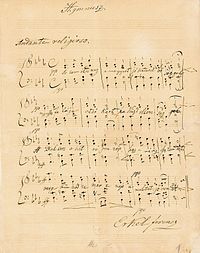Гимн Венгрии: различия между версиями
| [непроверенная версия] | [отпатрулированная версия] |
| Строка 24: | Строка 24: | ||
!Himnusz |
!Himnusz |
||
!Гимн (перевод Александра Кирилова) |
!Гимн (перевод Александра Кирилова) |
||
!Anthem (перевод Уильяма Лоу, 1881) |
|||
|- |
|- |
||
| |
| |
||
| Строка 170: | Строка 171: | ||
За грядущее народ<br /> |
За грядущее народ<br /> |
||
И прошлое страдал! |
И прошлое страдал! |
||
| |
|||
O, my God, the Magyar bless<br /> |
|||
With Thy plenty and good cheer!<br /> |
|||
With Thine aid his just cause press,<br /> |
|||
Where his foes to fight appear.<br /> |
|||
Fate, who for so long did’st frown,<br /> |
|||
Bring him happy times and ways;<br /> |
|||
Atoning sorrow hath weighed down<br /> |
|||
Sins of past and future days.<br /> |
|||
By Thy help our fathers gained<br /> |
|||
Kárpát’s proud and sacred height;<br /> |
|||
Here by Thee a home obtained<br /> |
|||
Heirs of Bendegúz, the knight.<br /> |
|||
Where’er Danube’s waters flow<br /> |
|||
And the streams of Tisza swell<br /> |
|||
Árpád’s children, Thou dost know,<br /> |
|||
Flourished and did prosper well.<br /> |
|||
For us let the golden grain<br /> |
|||
Grow upon the fields of Kún,<br /> |
|||
And let nectar’s silver rain<br /> |
|||
Ripen grapes of Tokay soon.<br /> |
|||
Thou our flags hast planted o’er<br /> |
|||
Forts where once wild Turks held sway;<br /> |
|||
Proud Vienna suffered sore<br /> |
|||
From King Mátyás’ dark array.<br /> |
|||
But, alas! for our misdeed,<br /> |
|||
Anger rose within Thy breast,<br /> |
|||
And Thy lightnings Thou did’st speed<br /> |
|||
From Thy thundering sky with zest.<br /> |
|||
Now the Mongol arrow flew<br /> |
|||
Over our devoted heads;<br /> |
|||
Or the Turkish yoke we knew,<br /> |
|||
Which a free-born nation dreads.<br /> |
|||
O, how often has the voice<br /> |
|||
Sounded of wild Osman’s hordes,<br /> |
|||
When in songs they did rejoice<br /> |
|||
O’er our heroes’ captured swords!<br /> |
|||
Yea, how often rose Thy sons,<br /> |
|||
My fair land, upon Thy sod,<br /> |
|||
And Thou gavest to these sons,<br /> |
|||
Tombs within the breast they trod!<br /> |
|||
Though in caves pursued he lie,<br /> |
|||
Even then he fears attacks.<br /> |
|||
Coming forth the land to spy,<br /> |
|||
Even a home he finds he lacks.<br /> |
|||
Mountain, vale – go where he would,<br /> |
|||
Grief and sorrow all the same –<br /> |
|||
Underneath a sea of blood,<br /> |
|||
While above a sea of flame.<br /> |
|||
‘Neath the fort, a ruin now,<br /> |
|||
Joy and pleasure erst were found,<br /> |
|||
Only groans and sighs, I trow,<br /> |
|||
In its limits now abound.<br /> |
|||
But no freedom’s flowers return<br /> |
|||
From the spilt blood of the dead,<br /> |
|||
And the tears of slavery burn,<br /> |
|||
Which the eyes of orphans shed.<br /> |
|||
Pity, God, the Magyar, then,<br /> |
|||
Long by waves of danger tossed;<br /> |
|||
Help him by Thy strong hand when<br /> |
|||
He on grief’s sea may be lost.<br /> |
|||
Fate, who for so long did’st frown,<br /> |
|||
Bring him happy times and ways;<br /> |
|||
Atoning sorrow hath weighed down<br /> |
|||
All the sins of all his days. |
|||
|} |
|} |
||
Версия от 11:35, 23 апреля 2016
| Национальный гимн Венгерской Республики | |
|---|---|
| Himnusz | |
 Нотная запись гимна Венгрии | |
| Автор слов | Ференц Кёльчеи, 1823 |
| Композитор | Ференц Эркель, 1844 |
| Страна | |
| Утверждён | 1918 |
|
Himnusz Himnusz |
|
Гимн Венгрии — композиция «Himnusz», также известная по первой строке как «Isten, áldd meg a magyart» («Боже, благослови мадьяр»). Автор слов — Ференц Кёльчеи (Kölcsey Ferenc). Автор музыки — Ференц Эркель (Erkel Ferenc).
Текст и перевод
| Himnusz | Гимн (перевод Александра Кирилова) | Anthem (перевод Уильяма Лоу, 1881) |
|---|---|---|
|
Isten, áldd meg a magyart Őseinket felhozád Értünk Kunság mezein Hajh, de bűneink miatt Hányszor zengett ajkain Bújt az üldözött, s felé Vár állott, most kőhalom, Szánd meg Isten a magyart |
Одари, Господь, добром, На верха святых Карпат На равнинах Кунша дар Но, увы! наш грех храня, О, как часто изо ртов Меч изгнанника сражал, Вместо замка — груз камней, Боже! Венгров пожалей! |
O, my God, the Magyar bless By Thy help our fathers gained For us let the golden grain But, alas! for our misdeed, O, how often has the voice Though in caves pursued he lie, ‘Neath the fort, a ruin now, Pity, God, the Magyar, then, |
См. также
Ссылки
- венгерские гимн (Видео с субтитрами на 33 языках)
- Музыка гимна (без слов) mp3
- о файле ogg
- Исполнение гимна на телеканале M1 (конец вещания) на YouTube
Это заготовка статьи о государственных и политических символах. Помогите Википедии, дополнив её. |
